The Chinese Communist Party (CCP) claims to support private enterprises while increasing pressure on them to strengthen its control. The latest data released by the Ministry of Education of the CCP shows that the total number of private schools in China continues to decrease, with over 20,000 fewer schools in the past four years.
According to mainland China’s “The Paper” on October 25th, citing the “National Education Development Statistics Bulletin for 2023,” in the private education sector, there are a total of 167,200 private schools in China, a decrease of 11,000 annually, accounting for 33.54% of the total number of schools nationwide. There are 49.3953 million students enrolled, a decrease of 3.4319 million students annually.
It is reported that the main decrease is in private kindergartens, with a total of 149,500 kindergartens, a decrease of 11,013 annually. There are 10,100 private schools for compulsory education (grades 1 to 9), a decrease of 425 schools annually.
The report points out that since 2020, the total number of private schools nationwide has continuously decreased for four years, totaling a reduction of over 20,000 schools.
In recent years, the CCP has imposed restrictions on the scale of private schools, with no new private compulsory education schools being approved in various regions. The proportion of students in private compulsory education schools is kept within 5%. Authorities have also strengthened CCP control over education through legislation.
On April 7, 2021, the State Council of the CCP issued the revised version of the “Regulations on the Implementation of the Promotion of Private Education Law,” which was implemented on September 1 of the same year. The “Regulations” specifically mention “Party leadership”; in Article 63 on penalties, the first item is “violating the national education policy, deviating from the socialist orientation of running schools, or failing to ensure that the school’s party organization fulfills its duties.” It also stipulates that the decision-making body of private schools should include the party organization’s leader, and the supervisory body should have a representative of the grassroots party organization. The school’s articles of association should specify the procedures for the party organization’s leader to enter the school’s decision-making and supervisory bodies.
Furthermore, the “Regulations” also make similar provisions regarding investment, internet technology, teaching materials, and teachers. These include requiring hired teachers to undergo appropriate ideological and political training; “the use of foreign teaching materials should comply with relevant national regulations”; domestic foreign-invested enterprises and socially organized entities controlled by foreigners cannot establish private schools providing compulsory education, among others.
Private schools in mainland China have long been suppressed, with some even forcibly demolished, such as more than 40 private kindergartens and primary schools in Huaiyang County and Luyi County in Zhoukou City, Henan Province in 2018.
On August 11, 2021, the British Financial Times reported that within just three months, various local governments in China had taken over at least 13 for-profit elementary, middle, and one high school without compensation. The owners of the schools forced to hand over to the government reluctantly said there was “no choice.” The $100 billion annual output of the private education and training industry has become the most obvious sacrifice in China’s gradual move toward state ownership within the vast for-profit education industry.
The report also indicates that the CCP government is uneasy about the rise of this industry, believing it increases the difficulty of controlling education.
In July 2021, the Ministry of Education of the CCP and eight other central ministries issued a document requiring that “private schools separately operated by public schools, and compulsory schools jointly operated by public schools and local governments and relevant institutions, should be operated as public schools.” Official approval is also no longer granted to new “public-private partnership” schools. In practice, even before the announcement of the above notice, various regions had already announced the “conversion of private schools to public,” but state media reports barely mentioned the government’s specific compensation policies for these private schools. State media also reported that some schools have chosen to “donate as a whole to the government.”
Radio Free Asia has quoted analysts as saying that the CCP is deeply concerned about the phenomenon of private enterprises and private schools operating outside CCP control. The crackdown on private schools is also part of the CCP’s larger plan to strengthen social control.
Previous reports have also shown a significant number of closures of private kindergartens in recent years, which may be related to China’s declining birth rate.

